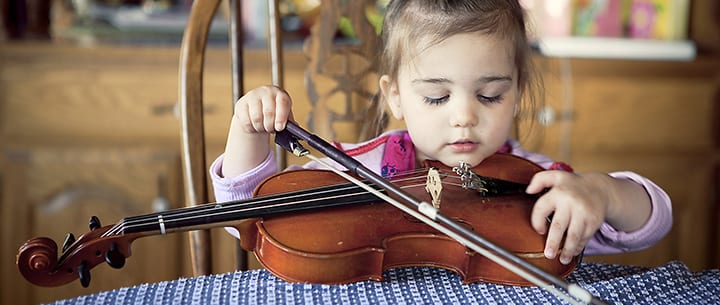Any age is right for introducing your child to music! Here, Corona, CA teacher Milton J. share some ideas for music activities for kids of all ages…
Have a child who can’t stop singing, tapping, or dancing? Congratulations, your child is musically inclined! There are some wonderful ways of introducing your young one to music that are exciting and fun, while also enriching their development and increasing your own enjoyment as a parent. Whether your child is an infant, toddler, preschooler, or older, there’s something for every child of every age!
Infants
The music infants hear is mostly dependent on their caregivers. Singing simple, short songs to infants in a high, soft voice with a few lines about bathing, dressing, or eating while you do these activities helps them liken melody to the activity, which improves their astuteness, but also helps them resonate joy with those melodies. Additionally, nursery rhymes said with rhythm and repetition is pleasing for older infants. You also can provide rhythmic activities for younger infants by rocking them or clapping and patting their hands together. Babies will respond with excited movements like swaying, waving, and bouncing. Babies’ responses of gurgling, cooing, and happy shouting are their own unique way of making music themselves!
Toddlers
Activities for toddlers from 18 months through three years should incorporate short songs. As their memories are not fully developed, they can remember only a few words at a time. Repeating songs encourages the use of words and memorization. When caring for toddlers, listen when they begin to sing spontaneously. Repeat the songs or nursery rhymes over and over. A fun game to play with them is to create rhythms by clapping or tapping a metal pan with a wooden spoon. Most 3-year-olds will be able to listen and repeat while enjoying using cookware for something other than when mommy or daddy makes dinner (although be sure to monitor them if they decide to search for the pan and spoon themselves!).
For another idea, when music plays on the radio or the stereo at home, call out movements for them to make that involve various parts of their bodies. Ask them to jump and hop, smile and frown, or punch the air with their fists. Then, ask them to sit on the floor or stand on one foot each time you turn the music off. This is a fun activity for toddlers and can be played with all kinds of music.
Preschoolers
Children who are four and five naturally love to sing! My 5-year-old nephew is singing constantly. Preschoolers tend to like songs that repeat words and melodies, rhythms with a definite beat, and words that ask them to do things. Preschool children also enjoy nursery rhymes and songs about familiar things like toys, animals, play activities, and people.
For your preschooler, provide a wide variety of music for them to listen to, like folk songs, symphonies, operas, rock and roll, oldies, jazz standards, and soundtracks from their favorite movies and educational TV shows. For a game, suggest that everyone pretend to be animals or objects like cats, elephants, trucks, or bouncing balls, and then imitate these in response to the music. This will help your child interpret the music with movement and help him or her internalize rhythm and syncopation.
School-Age Children
Like toddlers, the attention span of school-age children is short. Most 6-to 9-year-olds respond best to songs about everyday happenings. Songs that involve counting, spelling, or remembering a sequence of events are popular. Songs and musical activities with other school subjects are also effective during this stage in their development. Words that tell stories about athletic games, other countries, famous men and women, or scientific discoveries are well-liked and easily remembered. Remember to keep these verses fairly short and limited to one thought.
Now, early school-age children are able to establish relationships with their friends and can use their musical experiences to form friendships. They may have a strong interest in taking music lessons or playing in a band. They may also want to listen to music after school with friends or sing in a church or community choir. They are conscientious about practicing and may take a liking to singing or percussion instruments.
As the parent, listen to the music they want to play for you. Suggest that they sing and play their musical instrument for you or together as a group with their other musical friends. If you let the children take turns directing this “jam session” and join in as an enthusiastic member, their interest will surely last much longer.
Enjoy introducing and encouraging your child’s love for music, parents! We hope to see them taking lessons with a great TakeLessons instructor in the near future.
 Milton J. teaches guitar, piano, singing, music recording, music theory, opera voice, songwriting, speaking voice, and acting lessons in Corona, CA. He specializes in classical, R&B, soul, pop, rock, jazz, and opera styles. Learn more about Milton here!
Milton J. teaches guitar, piano, singing, music recording, music theory, opera voice, songwriting, speaking voice, and acting lessons in Corona, CA. He specializes in classical, R&B, soul, pop, rock, jazz, and opera styles. Learn more about Milton here!
 Photo by swambo
Photo by swambo
Suzy S.

